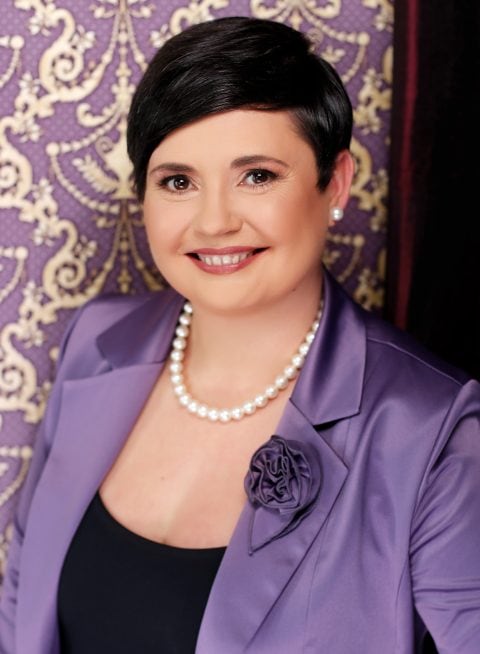What are the things that we, women, do that make our lives more difficult at work? What is the key to succeeding in today’s turbulent corporate environment and at the same time experience a deep feeling of accomplishment? And is it really about taking over traditional male roles or is it more about putting our energy in the service of creating a new world of complementary energies at work?
Elisabet Rodriguez Dennehy, the founder and president of Rodriguez & Associates, a strategic consulting firm headquartered in Pittsburgh, Pennsylvania, shares her views on these topics and many more.
Elisabet Rodriguez Dennehy is known in the Czech Republic for developing strategic programs for women in leadership with local companies.
For the last seven years she has been teaching coaching and mentoring as faculty at the Executive Leadership Program for the University of Pittsburgh in Prague, Czech Republic, and Sao Paolo, Brazil. Some of the participating companies include Dow, PWC, Deloitte, PPG and ČEZ.
Dennehy, who is a fervent supporter of women’s personal and career growth, is also the author of the book Can You Afford to Ignore Me? How to Manage Gender and Cultural Differences at Work.
In September, she was the lead figure of the conference Reframing the Dialogue From Quotas to Complementarity, organized in partnership with the magazine Business Woman.
Elisabet, how would you characterize the current stage of development for women striving for equality in corporate and political leadership?
I think the present stage is really interesting. We are at the crossroad of a few very important scenarios coming together.
One is that there are a lot of global companies really talking about enhancing the capacity of their workforce. By talking about the workforce we talk about women. This is a great opportunity at the entry level for women to become aware that they are very desirable on the labor market right now.
On the other hand, at the top level we also find global companies saying that we need to fix the numbers. Even thought the discussion has been going on for a long time, I can really say that it’s really now starting to become a prime agenda at the top of even the most conservative organizations.
Three, I think we’re finally finding a common ground and common vocabulary. We are really starting to go from an adversarial place to a place where there is a higher degree of interest and dialogue.
I am really optimistic because I can see that this is becoming the new reality.
You mentioned that the top management of even the most conservative companies is placing the discussion on women in leadership high on their agenda. Is that in response to legislative pressures from Western governments or is it a need coming from within the companies?
In the US, the legislative pressure has always been there ever since 1964 when it all started. The beauty of compliance is that it provokes a conversation and it makes it worth for you to have the conversation.
This is going to sound strange, but the workforce [Editor’s note: on the Western markets] is becoming scarce.
Let me explain what I have in mind. In industrialized countries there is either a zero population replacement or it’s starting to become zero.
Right now we have Germany and Spain going through that problem. These countries are not creating a pipeline of human capital for their future.
I was just listening to news that in Spain, by 2050 the country will be almost 40% over 80 years old. That’s an incredibly high number.
What this means is that when companies find great talent, they really need to keep everybody, especially the women. It’s becoming ever more of a strategic decision because people are leaving their jobs because of demographics and there is no one to take over the business.
The word “quotas” brought an allergy to many a manager and company across the European Union for the last few years. What is your take on the matter of quotas for women in top management and politics?
I’ve always said that quotas are the reason to have the conversation in the first place. Without quotas we leave the whole process in disarray.
Let’s assume we forget about quotas and hire the way we’ve always hired. The question would be: would things change?
I always say that where there is no pain, there is no gain. What happens with quotas is that their consequences are penalties, basically forcing people into taking certain action.
There is a misconception of quotas in terms of forcing you to hire people not on the grounds of their merit.
This really isn’t about hiring women and putting them into positions for which they are not fit, but it’s mainly about keeping the conversation about how we bring the women into the workforce rolling. The whole issue of compliance is a structural piece for the dialogue to have.
People in Europe have told me many times that they don’t like quotas. I said that, without quotas, you don’t have the pain, and without the pain you don’t have the gain.
Can you point at three things how women are making their lives more difficult at work?
I think it’s not intentional. I think that what happens with women – and men, because it applies to both – is that we don’t know the things that we’re doing and are making our lives more difficult.
The issue number one that many women would point at is that there is a lack of awareness of the fact that there is more power in their hands than they think they have. So, it’s assuming that they don’t have the power when in fact they do have it.
Two, I think women don’t allow themselves to think through what they want. Unless I know what I want it’s very difficult for the system to respond to me and give me what I need.
At the conference we had women professionals, partners and members of company boards. The first thing that they say when asked how they got there is: I asked and I got it. I wanted it and I took my chance.
The third thing where women fail – which is part of our upbringing – is that we don’t understand the importance of the dialogue that we need to have in terms of our presence and how we describe our work. How we present ourselves.
Unfortunately women are raised to be nice, much more egalitarian and pretty much conflict-adverse. I think the consequence of all that is that we do not allow ourselves to think bigger, to ask for more, to be more expensive, to understand the impact of the consequences of my image and my own appearance.
I think it’s not about women making it more complicated for them purposefully. I think it’s just a gap in understanding and I think that’s the value that women like me bring to the market in helping other women to understand that there is another possibility for themselves that is going to make their lives easier.
You create development programs for women in corporations. Yet you’re an entrepreneur. Do you perceive a difference in terms of succeeding within a corporation and outside, out on the open ocean?
Obviously the benefit of owning your company and controlling your future is freedom.
In a corporate organization you have to navigate the political structures – they are a part of your life. Entrepreneurship is completely the opposite: it’s the ability to do and act and make decisions in three seconds. It’s never going to happen that way in a large organization, which requires more structure, more competing and more stakeholders.
That’s why I could have never worked for an organization. I can go in, spend time and leave as a consultant but my experience is that I am too independent.
This is another thing: knowing who you are and what you really can do. I just knew that [corporate structures] are not for me. Yet I can be present for them in the role of support.
Speaking of knowing who you are, could you point at three things that were essential not only to your success of a business woman, but also to your happiness?
I knew I was intense ever since I was a child. That’s very much who I’ve been; it’s my source of joy in life.
I’m very enthusiastic and very adventurous. Bringing that sense of adventure to the business world allows me to think about business models that are not traditional anywhere in the world. Maybe for the last 10 years I’ve been really comfortable with what I know and what I don’t know.
I always say that the 50s are the best because they free women to really allow themselves to fully-blown be. Who I am has always been there, it’s just that now it’s so much easier to walk with me everywhere.
I think the third thing that I have is that I like to ask. I’m a learner by nature; I have been constantly asking how, why, when since I have memory. In that respect I am humble because I really know how little I know. So, I constantly want to learn more, read more and so on. It’s really awesome because it’s simply putting me in a place of knowing that tomorrow there is something new. It’s almost like a re-energizing process.
Do you have a message for the women in business, either corporate or entrepreneurs, in the Czech Republic for the year to come?
Yes. Yes I do. It’s a message I am carrying with me everywhere I go. It is: Follow your passion and don’t negotiate your inner voice. That inner voice is telling you the truth.
Make your time be invested in making sure that that passion is the one that drives you to work every Monday morning. If you align yourself with that inner voice – with your passion and your desire – if you allow that inner voice to take you wherever it goes, you’re going to end up in a really good place.
So, stop questioning your dreams. Just go after them because, ironically, that’s what you were meant to do in the first place. That’s who you were meant to be. Just move forward without fear.


